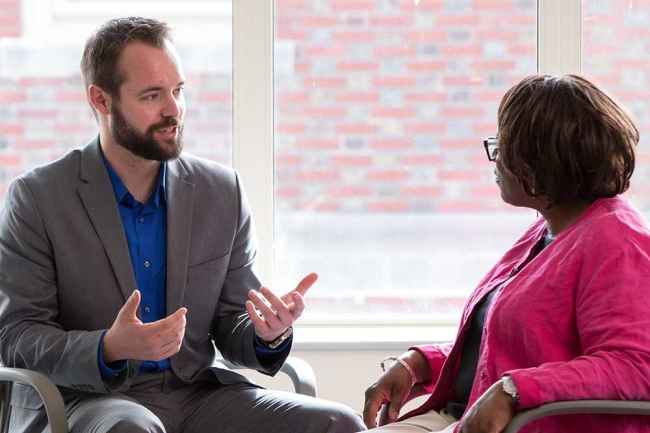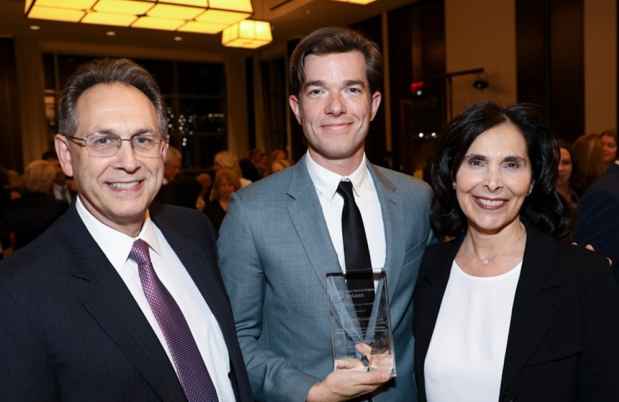Alcohol, Drug, and Addiction Outpatient Program
World-Class Addiction Care in an Outpatient Setting
The Alcohol, Drug, and Addiction Outpatient Program provides treatment for individuals with substance use disorders, including the misuse of alcohol, prescription and non-prescription drugs—such as heroin, fentanyl, cocaine, marijuana, or opioids such as Oxycontin or Percocet.
Our expert staff specializes in treating those whose substance use disorder is complicated by other psychiatric illnesses, such as depression, anxiety, bipolar disorder, and post-traumatic stress disorder. We also support individuals who struggle with addictive behaviors, such as gambling, gaming, sex, and love.
For more information or to make a referral, please call 617.855.3505.
The emphasis of the outpatient program, reinforced by evidence-based treatments and cutting-edge therapy models, is to provide a sufficient level of stability for the patient.
Our robust group therapy programming focuses on integrated group therapy for dual diagnosis, as well as early recovery and specialized recovery treatment.
Individual therapy, including medication management, is available and emphasizes evidence-based therapies for treatment of addiction.
The Alcohol, Drug, and Addiction Outpatient Program also offers specialized services for:
- Health care professionals
- Law enforcement officers, first responders, and active duty military members
- Individuals experiencing intimate partner violence
- Older adults
- Those who may need medication treatment for opioid use disorders and alcohol use disorders
We understand that seeking treatment can feel overwhelming. We aim to help patients set treatment goals and identify care recommendations that match the individual’s needs and ability to participate.
According to the National Council on Alcoholism and Drug Dependence, 17.6 million Americans, or 1 in every 12 adults, struggle with alcohol misuse or dependence.
Treatment Approach
Our expert staff works in close partnership with patients and families to create a customized treatment plan for each individual based on their substance use history and symptoms, the severity of symptoms, and other co-occurring psychiatric diagnoses.
Treatment plans can vary in intensity and include a combination of individual and group therapies, a variety of proven addiction treatment models, and medications that help patients manage their symptoms and transition back to their daily lives.

Staff in the Division of Alcohol, Drugs, and Addiction are dedicated to providing world-class addiction care
Treatment offerings range from our structured STAT program to a selection of our robust therapy groups, as well as individual therapy.
Our intensive STAT program includes three groups a week in addition to individual therapy once or twice a week, depending on needs. Program psychiatrists also offer medication management.
Each patient’s tailored care plan is targeted at reducing the severity of the patient’s symptoms. We provide tools, ongoing support, and resources to prevent relapse.
Family involvement is encouraged, and with the permission of the patient, family members are included in assessment, care, and aftercare planning. We offer support and education, including a virtual family support group on Wednesday evenings for families of McLean Hospital patients.
Learn more about McLean’s unique approach to addiction care.
Admission & Cost
Admission
The Alcohol, Drug, and Addiction Outpatient Program offers outpatient treatment for individuals ages 18 and older struggling with substance use disorders and other addictive behaviors, with or without other co-occurring mental health diagnoses, such as depression, anxiety, PTSD, and bipolar disorder.
For further information about our program or to make a referral, please contact our admissions coordinator:
Phone: 617.855.3505
Cost
The Alcohol, Drug, and Addiction Outpatient Program is covered by most insurance providers. McLean Hospital accepts Medicare, Massachusetts Medicaid, and many private insurance and managed care plans.
More information on insurance providers accepted by McLean Hospital may be found on the Mass General Brigham website. You may also find it beneficial to review McLean’s patient billing and financial assistance information.
We understand that navigating the insurance system can be challenging. We welcome your questions and concerns.
Treatment Team
Program Leadership

Olivera J. Bogunovic, MD, Medical Director
Dr. Bogunovic’s primary areas of clinical innovation are in developing effective treatments for benzodiazepine use disorders and developing novel treatments for elderly patients with substance use disorders. In addition to clinical and administrative roles, Dr. Bogunovic also teaches medical students, residents, and addiction and geriatric fellows.
Staff and Associates
Our multidisciplinary clinical staff has extensive background in the treatment of substance use disorders and co-occurring mental health conditions. Our team of clinicians and support staff includes board-certified addiction psychiatrists, licensed clinical social workers and family therapists, registered nurses, and mental health specialists.
Team members are dedicated to working in close partnership with patients and families to provide high-quality care tailored to each individual’s needs. Staff has experience working with patients from diverse cultural and socioeconomic backgrounds from across the country and around the world.
The Division of Alcohol, Drugs, and Addiction is led by Roger D. Weiss, MD.
Frequently Asked Questions
Where is the Alcohol, Drug, and Addiction Outpatient Program located?
The program is located on the Belmont campus, in Proctor House. For more information on directions and parking, please visit our Maps & Directions page.
Who benefits most from the program?
We focus on treating adults with substance use disorders, with or without other co-occurring psychiatric conditions. We also support those who may be struggling with addictive behaviors unrelated to drugs or alcohol. The program is best suited to those who are seeking outpatient level of care.
Is family involved in treatment?
Family involvement is strongly recommended. With permission of the patient, family members can be involved in assessment, treatment, and aftercare planning.
Is smoking permitted?
Smoking is allowed in designated outdoor areas. No smoking is allowed inside any of our buildings.
Are cell phones allowed?
Except during groups, cell phones are permitted, with some guidelines to prevent disruption of the program and other patients and to protect privacy.
Is aftercare planning a part of the program?
The treatment team works closely with the individual as well as with family, significant friends, and outside providers to develop a personalized aftercare plan. Recommendations by staff are made based upon clinical needs, progress made during treatment, and long-term treatment goals.
Can former patients access their medical records?
All requests for medical records should be directed to McLean’s Health Information Management Department.
Are support groups offered during and after treatment?
To complement our programs’ services and encourage individuals’ initiatives in their own treatment course, we encourage patients to seek peer support. Organizations such as Alcoholics Anonymous and Narcotics Anonymous offer self-help groups on McLean’s campus and other nearby areas.
Does McLean gather patient feedback?
McLean is dedicated to maintaining high-quality and effective patient care. To ensure that those standards remain at the highest level, we utilize a number of feedback instruments and quality indicators.
Among these tools are the Perceptions of Care survey which monitors patient satisfaction and BASIS-24™, a psychiatric outcomes measurement tool created at McLean and widely used in the U.S. and around the world, which delivers feedback on the patient care experience.
We Are Here to Help
Call us today to learn more about addiction treatment options at McLean.



